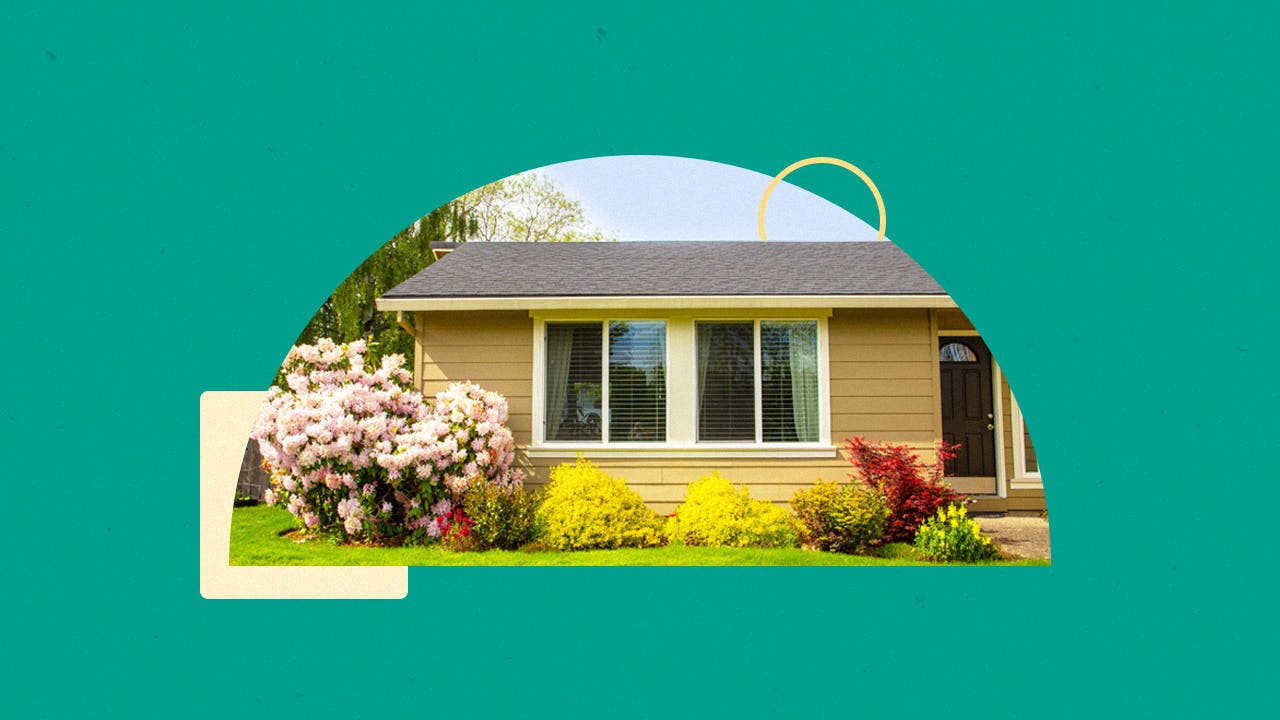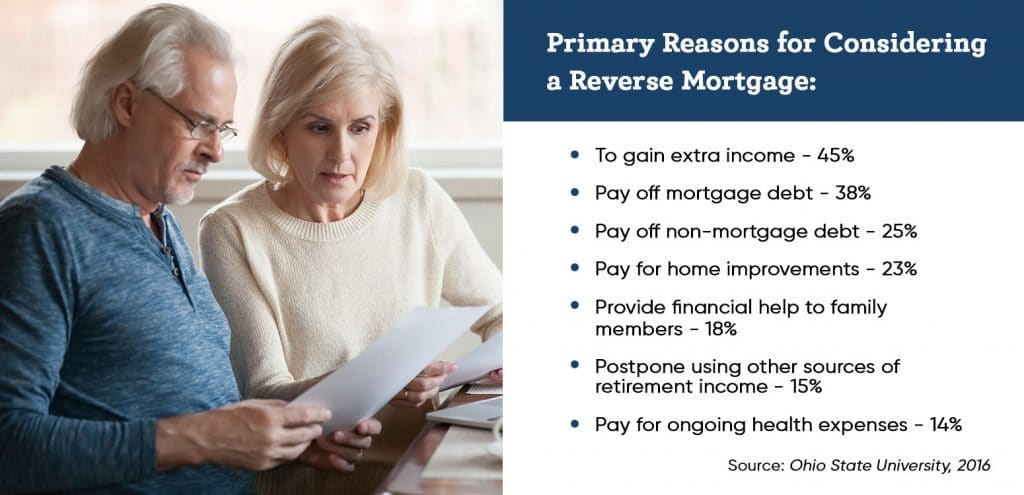How to Purchase Reverse Mortgage for a Secure Retirement Income
How to Purchase Reverse Mortgage for a Secure Retirement Income
Blog Article
Empower Your Retired Life: The Smart Means to Purchase a Reverse Mortgage
As retired life strategies, lots of people seek efficient approaches to enhance their economic self-reliance and health. Amongst these strategies, a reverse home loan arises as a practical choice for home owners aged 62 and older, allowing them to tap into their home equity without the necessity of regular monthly settlements.
Recognizing Reverse Mortgages
Understanding reverse home loans can be crucial for property owners seeking monetary versatility in retirement. A reverse home loan is a monetary item that enables eligible house owners, usually aged 62 and older, to convert a portion of their home equity into money. Unlike traditional home loans, where debtors make regular monthly repayments to a loan provider, reverse home mortgages enable property owners to receive payments or a round figure while retaining possession of their residential property.
The amount available through a reverse home loan depends on numerous aspects, including the home owner's age, the home's worth, and current rates of interest. Importantly, the finance does not need to be paid back until the home owner offers the home, leaves, or dies.
It is essential for possible customers to recognize the ramifications of this monetary product, consisting of the effect on estate inheritance, tax obligation considerations, and recurring duties related to building maintenance, taxes, and insurance. In addition, counseling sessions with accredited specialists are commonly called for to make certain that customers totally comprehend the terms and problems of the funding. In general, a comprehensive understanding of reverse mortgages can equip homeowners to make educated choices about their monetary future in retired life.
Benefits of a Reverse Home Loan
A reverse mortgage offers a number of engaging benefits for eligible house owners, especially those in retired life. This financial tool enables elders to transform a part of their home equity right into cash money, providing important funds without the demand for regular monthly home mortgage payments. The cash acquired can be utilized for different objectives, such as covering clinical expenses, making home enhancements, or supplementing retired life earnings, therefore boosting total financial flexibility.
One considerable benefit of a reverse home loan is that it does not call for settlement until the property owner leaves, markets the home, or dies - purchase reverse mortgage. This feature enables retirees to maintain their way of living and fulfill unexpected costs without the burden of monthly repayments. In addition, the funds obtained are typically tax-free, allowing property owners to utilize their money without concern of tax obligation ramifications
Additionally, a reverse home loan can provide assurance, recognizing that it can serve as a monetary safeguard throughout challenging times. Property owners also keep ownership of their homes, ensuring they can proceed staying in an acquainted setting. Ultimately, a reverse home mortgage can be a critical monetary resource, empowering retired people to handle their financial resources efficiently while enjoying their gold years.
The Application Refine
Browsing the application procedure for a reverse mortgage is a vital action for house owners considering this economic option. The first phase includes reviewing eligibility, which commonly needs the property owner to be at the very least 62 years old, very own the residential or commercial property outright or have a reduced home loan equilibrium, and occupy the home as their main residence.
As soon as eligibility is validated, property owners must undergo a therapy session with a HUD-approved counselor. This session makes certain that they fully understand the implications of a reverse mortgage, consisting of the duties entailed. purchase reverse mortgage. After finishing therapy, applicants can proceed to collect necessary paperwork, consisting of proof of earnings, properties, and the home's value
The next step requires submitting an application to a loan provider, that will evaluate the financial and residential or commercial property credentials. An appraisal of the home will certainly additionally be conducted to determine its market worth. If accepted, the lender will provide financing terms, which need to be examined meticulously.
Upon acceptance, the closing process complies with, where last documents are signed, and funds are web link disbursed. Comprehending each phase of this application process can substantially boost the homeowner's confidence and decision-making concerning reverse home loans.

Key Considerations Prior To Investing In
Acquiring a reverse home loan is a considerable monetary decision that calls for cautious consideration of several key factors. Understanding your qualification is vital. House owners should go to least 62 years old, and the home must be their key home. Assessing your monetary requirements and goals is just as essential; identify whether a reverse home mortgage aligns with your long-term strategies.

Furthermore, evaluate the influence on your existing way of living. A reverse mortgage can impact your qualification for particular federal government benefits, such as Medicaid. Look for expert support. Consulting with an economic expert or a housing therapist can supply useful understandings customized to your private situations. By completely reviewing these factors to consider, you can make an extra educated choice about whether a reverse home loan is the ideal monetary technique for your retirement.
Taking advantage of Your Funds
Once you have actually protected a reverse home loan, properly taking care of the funds comes to be a concern. The flexibility of a reverse home mortgage enables house owners to make use of the funds in different ways, yet calculated planning is necessary to maximize their advantages.
One vital approach is to develop a budget plan that describes your monetary objectives and monthly expenditures. By determining necessary costs such as healthcare, residential property taxes, and home maintenance, you can designate funds accordingly to make sure long-term sustainability. Furthermore, take into consideration using a portion of the funds for financial investments that can generate revenue or appreciate in time, such as mutual funds or dividend-paying supplies.
An additional essential facet is to preserve a reserve. Setting aside a get from your reverse mortgage can assist cover unexpected expenses, giving assurance and monetary security. Seek advice from with a financial advisor to check out feasible tax obligation effects and how to integrate reverse mortgage funds into your general retired life technique.
Ultimately, prudent administration of reverse home mortgage funds can improve your economic safety and security, permitting you to appreciate your retirement years without the stress and anxiety like this of financial uncertainty. Careful planning and informed decision-making will guarantee that your funds work successfully for you.
Final Thought
In verdict, a reverse home mortgage offers a viable financial strategy for seniors looking for to boost their retired life experience. By converting home equity into easily accessible funds, individuals can deal with necessary costs and secure additional financial sources without sustaining regular monthly repayments. Cautious consideration of the linked ramifications and terms is important to make the most of benefits. Ultimately, leveraging this economic device can help with better self-reliance and improve total lifestyle throughout retirement years.
Recognizing reverse mortgages can be essential for homeowners looking for financial versatility in retired life. A reverse mortgage is an economic item that permits qualified property owners, typically aged 62 and older, to convert a section of their home equity right into cash money. Unlike traditional mortgages, where debtors make monthly repayments to a lending institution, reverse home loans make it possible for homeowners to get settlements or a lump sum while keeping ownership of their home.
Overall, a complete understanding of reverse home mortgages can empower property owners to make educated choices concerning their financial future in retired life.
Consult with a monetary expert to discover feasible tax obligation effects and just how to incorporate reverse home mortgage funds right into your general retirement method.
Report this page